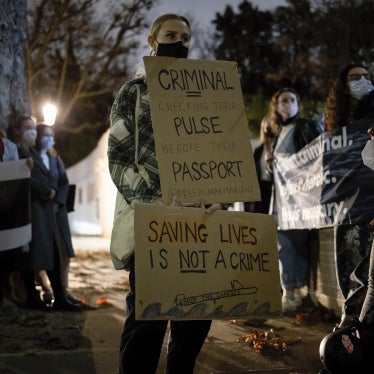(Moscow) – The Russian parliament should remove from consideration proposed amendments to the media law that would require foreign-funded media outlets that cover “political activities” to register as “foreign agents.”
The draft amendments mirror the 2012 law that requires nongovernmental advocacy organizations to register as “foreign agents.” This law has been the centerpiece of the Kremlin’s unprecedented crackdown on independent organizations.
“Having tightened the noose around groups that are critical of the government, Russia now wants to do the same to the media,” said Hugh Williamson, Europe and Central Asia director at Human Rights Watch. “The ‘foreign agent’ media amendments would be a huge blow to media that are already struggling to operate under severe restrictions.”
Several members of the State Duma, the lower house of the Russian parliament, submitted the draft amendments on May 29, 2014. They would require media with at least 25 percent foreign funding from either governmental or nongovernmental sources to register as “foreign agent media” if they cover “political activities.” The term “political activities” is very broad and vague and can include any current affairs coverage, Human Rights Watch said.
The law on “foreign agents” for nongovernmental organizations was pushed through parliament after Vladimir Putin’s return to the presidency in 2012 and was upheld by the Russian Constitutional Court in 2014. The law requires advocacy groups that accept foreign funding and engage in “political activity” to register as “foreign agents,” a term, popular in Russia during the Cold War and beyond and commonly understood to mean foreign spies and traitors.
The “foreign agents” law contradicts Russia’s international human rights obligations to protect freedom of association and expression. It has been consistently criticized by the United Nations, the Council of Europe, the European Union, and other agencies.
Not a single advocacy group has registered as a “foreign agent.” Nongovernmental groups have for the past year been fighting through the courts the authorities’ efforts to force them to register. In May parliament amended the law to authorize the Justice Ministry to register the groups without their consent.
The proposed amendments to the media law do not specify whether media outlets should register themselves as “foreign agents” or be registered by a government agency. The draft leaves it to the government to designate an agency to which the “foreign agent” outlets would report periodically on their foreign funding, specific expenditures, and activities. The draft amendments also say that all affected media outlets would have to indicate their “foreign agent” status on their publications.
The draft amendments are part of a broader Kremlin crackdown on media freedoms, Human Rights Watch said. In the past three months, the authorities have blocked or essentially taken editorial control over a number of independent news portals. In May a new law entered into force requiring Russian bloggers with significant followings to register with the authorities and comply with the same regulations as media outlets without the same protections and privileges.
Another legislative proposal, reportedly prompted by independent media coverage of the crisis in Ukraine, would introduce administrative and criminal offenses for editors who publish “false anti-Russian” information or offer media support to “anti-Russian extremist and separatist forces.” A draft law already submitted to the Duma would ban publishing negative information about the Russian government and military.
This is the third time in two years that legislators have attempted to introduce “foreign agent” media amendments. They first submitted amendments to the Duma in 2012, when the “foreign agent” measure was adopted for the nongovernmental groups. The authors withdrew the media amendments for revision, resubmitted them in November 2012, but withdrew them again in February 2014, and finally resubmitted them in May 2014 with very minor changes.
“The authors of the law are using anti-Western hysteria, heightened with the worsening of the crisis in Ukraine, to try to push through yet another piece of legislation that tramples fundamental freedoms,” Williamson said. “The space for free press and free expression, a cornerstone of a democratic society based on respect for human rights, is shrinking dramatically in Russia.”







